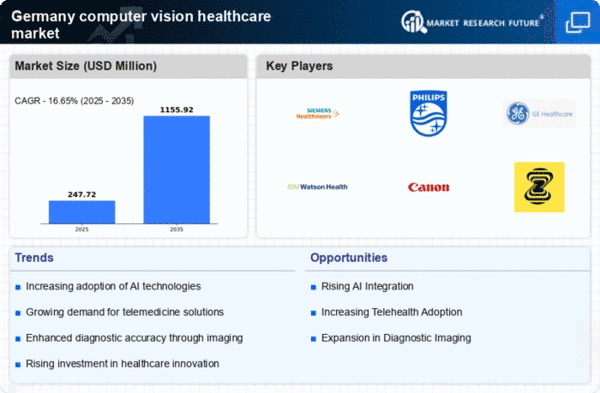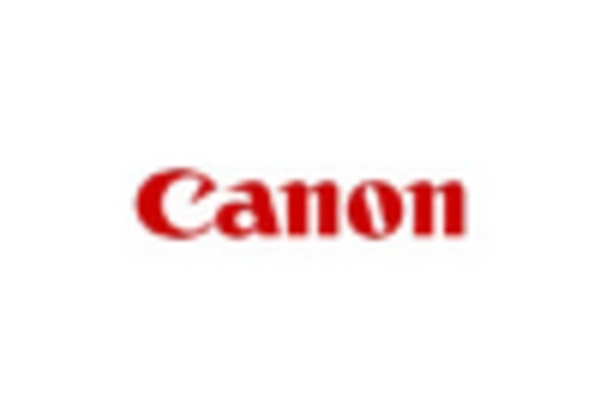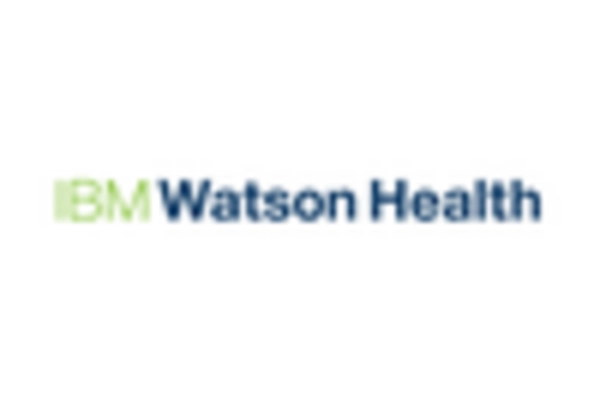Regulatory Framework Enhancements
The regulatory landscape for digital health solutions is evolving in Germany, positively impacting the computer vision-healthcare market. Recent enhancements in regulations are aimed at facilitating the approval and integration of innovative technologies in healthcare settings. These regulatory changes are likely to streamline the process for deploying computer vision applications, thereby encouraging more healthcare providers to adopt these solutions. As the regulatory environment becomes more supportive, it is anticipated that the market will experience accelerated growth, with an increasing number of computer vision technologies being implemented in clinical practice.
Advancements in Imaging Technologies
Technological advancements in imaging technologies are significantly impacting the computer vision-healthcare market in Germany. Innovations such as high-resolution imaging and real-time data processing are enhancing the capabilities of medical imaging systems. These advancements enable healthcare professionals to make more informed decisions, thereby improving diagnostic accuracy. The market for imaging systems is expected to reach €1.5 billion by 2026, reflecting a robust growth trajectory. As these technologies evolve, they are likely to facilitate the development of new applications in telemedicine and remote patient monitoring, further driving the adoption of computer vision solutions in healthcare.
Growing Focus on Personalized Medicine
The shift towards personalized medicine is influencing the computer vision-healthcare market in Germany. Healthcare providers are increasingly recognizing the importance of tailored treatment plans that cater to individual patient needs. Computer vision technologies are being utilized to analyze patient data and imaging results, enabling more precise treatment strategies. This trend is expected to drive market growth, as personalized approaches are associated with improved patient outcomes. The market for personalized medicine is projected to expand significantly, with computer vision playing a pivotal role in its evolution within the healthcare sector.
Increased Investment in Health Tech Startups
The computer vision-healthcare market in Germany is witnessing a surge in investment directed towards health tech startups. Venture capital funding has increased, with investments reaching approximately €500 million in the last year alone. This influx of capital is fostering innovation and the development of cutting-edge computer vision applications in healthcare. Startups are focusing on creating solutions that enhance diagnostic processes and patient care, which could lead to a more competitive market landscape. As these startups emerge, they are likely to contribute to the overall growth and diversification of the computer vision-healthcare market.
Rising Demand for Efficient Healthcare Solutions
The computer vision-healthcare market in Germany is experiencing a notable surge in demand for efficient healthcare solutions. This demand is driven by the increasing need for accurate diagnostics and patient monitoring systems. As healthcare providers seek to enhance operational efficiency, the integration of computer vision technologies appears to be a viable solution. According to recent data, the market is projected to grow at a CAGR of approximately 25% over the next five years. This growth is indicative of a broader trend towards automation and precision in healthcare, where computer vision plays a crucial role in improving patient outcomes and reducing costs.
















